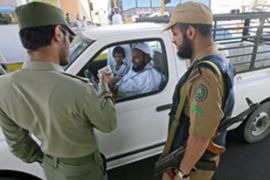Record numbers expected for Hajj
Security forces deployed in Mecca ahead of annual Islamic pilgrimage.

There is also the possibility of attacks and stampedes as the pilgrims move among holy sites in the city for five days.
Prince Nayef bin Abdul-Aziz, the Saudi interior minister, said security forces had “no information” suggesting any threat of violence during the Hajj.
However, he cautioned: “We must be ready and not rule out the occurrence of anything that might take us unawares.”
Past attacks
Last year, police arrested 28 alleged fighters suspected of planning attacks around the holy cities of Mecca and Medina.
In the past the Hajj has been blighted by fires, hotel collapses and deadly stampedes due to overcrowding.
Saudi authorities have constructed hundreds of thousands of fireproof tents in Mina, outside Mecca, where pilgrims will stay for three days from Monday.
The use of cooking instruments, such as gas stoves, is banned at the site.
The government will also be wary of political protests – Iranian pilgrims have been involved in clashes with police in the past.
Religious observance
The Hajj is one of the world’s biggest displays of mass religious devotion.
It is a religious duty for every able-bodied Muslim with the necessary financial resources to make the pilgrimage at least once during their lifetime to cleanse their sins.
The ceremony comes to a head on Sunday when pilgrims gather en masse on and around Mount Arafat, east of Mecca.
On Monday, when the festival of Eid al-Adha begins, worshipers will return to Mina where they will cast stones at three pillars in a symbolic renunciation of the devil.
No travel for Gazans
Saudi is placing strict controls on the number of pilgrims entering the country – giving a quota to each government who then select pilgrims.
But in the occupied Palestinian Territories the process encountered difficulties due to there being two governments – Hamas in the Gaza Strip and Fatah in the West Bank.
Many pilgrims in the Gaza Strip have been denied the opportunity to make the pilgrimage.
The limit for Gaza is 3,000 people, who are randomly selected.
However, two lists were provided for the West Bank and the Gaza Strip – although the Saudi government only granted visas for those from the West Bank.
Those in Gaza were therefore left without the possibility of undertaking the pilgrimage.